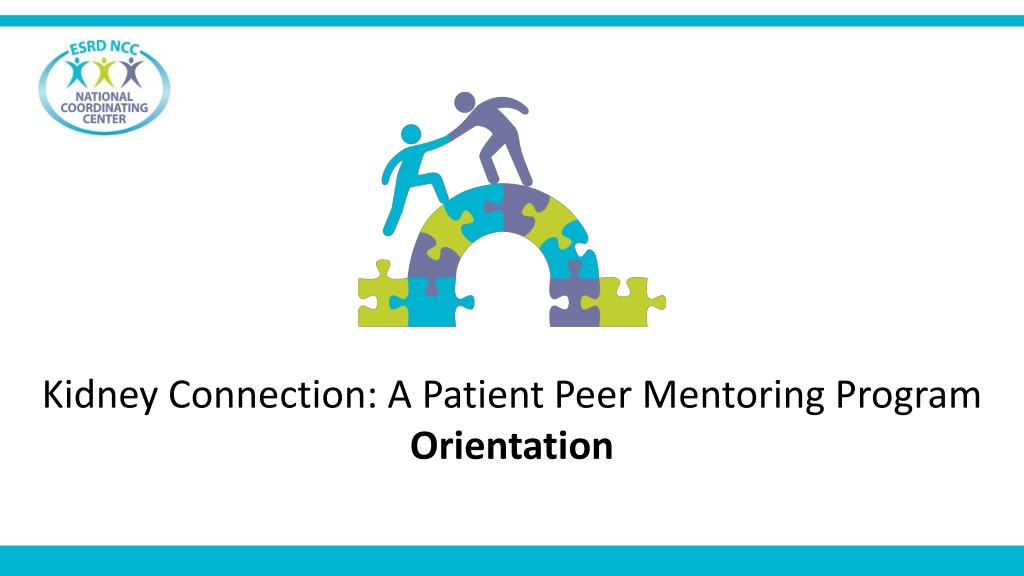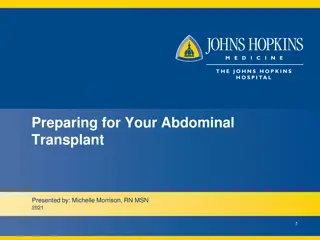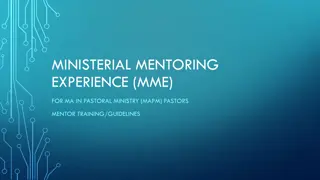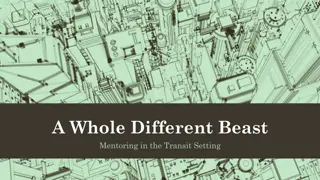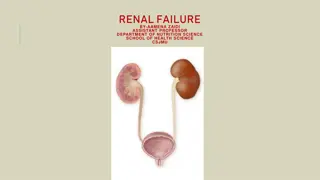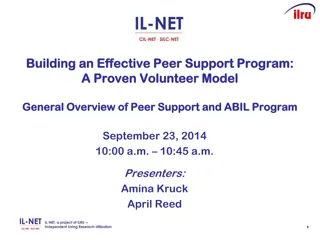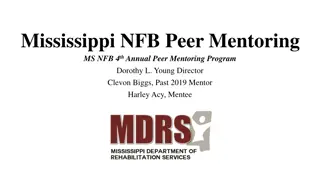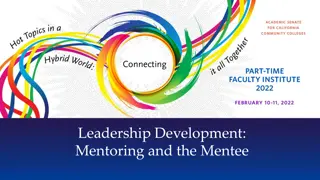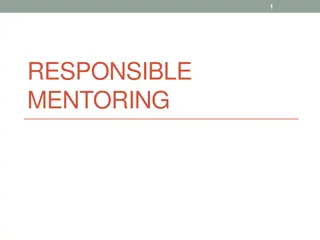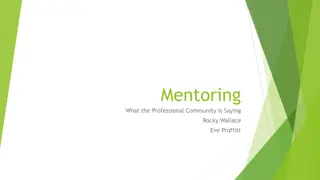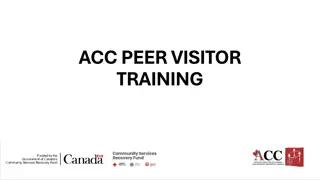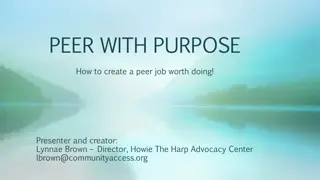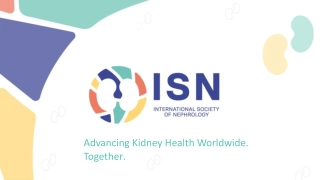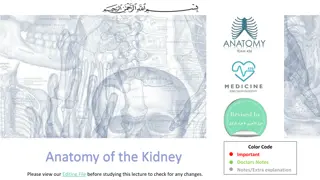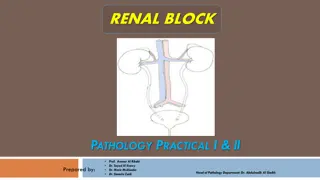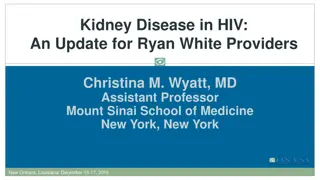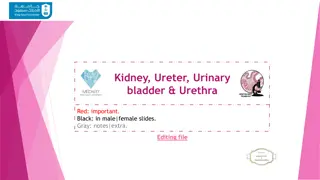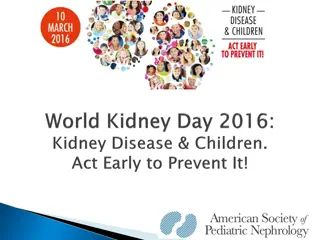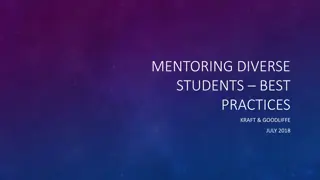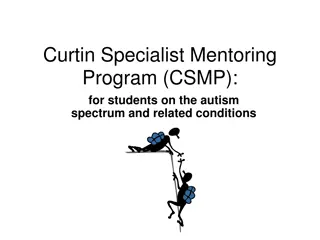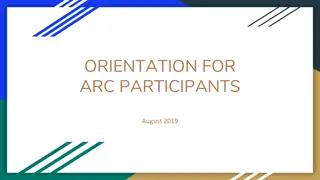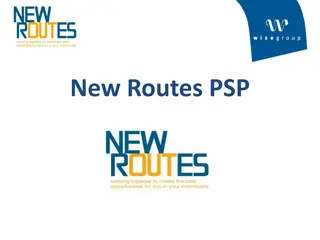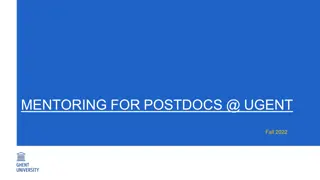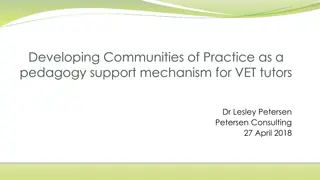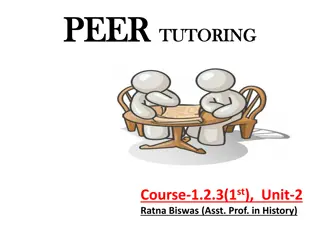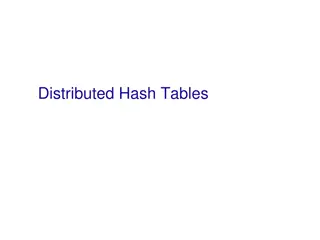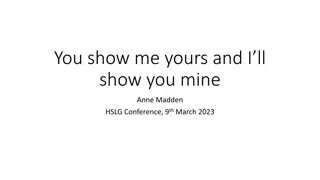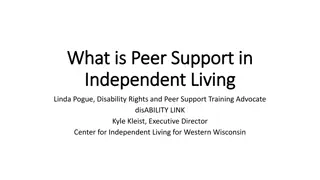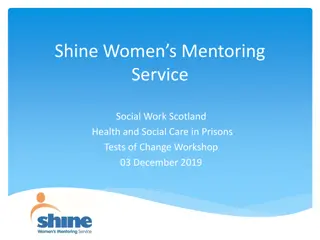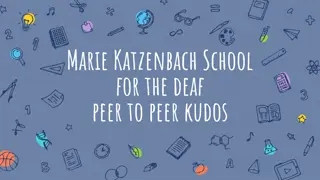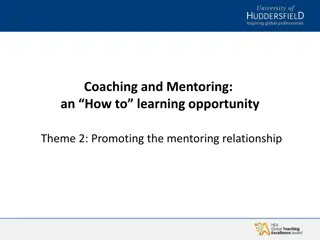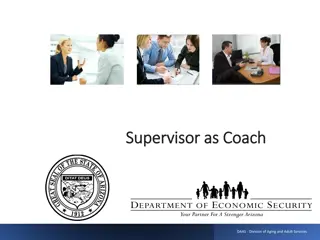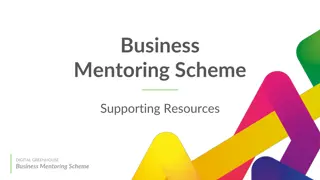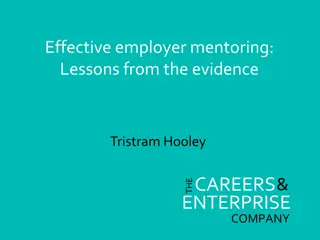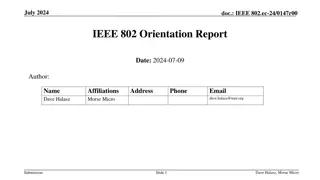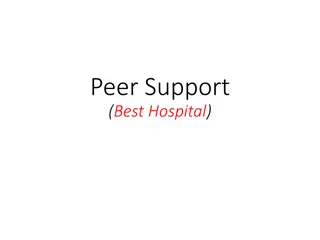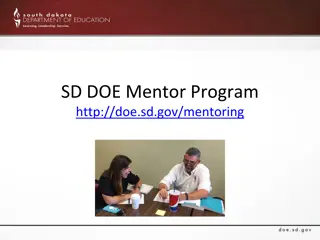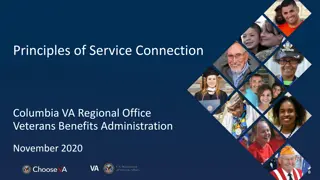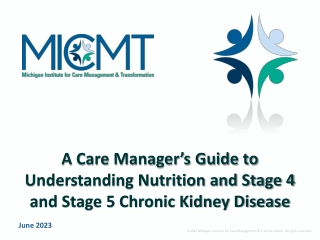Kidney Connection: Peer Mentoring Program Orientation
"The Kidney Connection program offers peer mentoring for individuals dealing with kidney disease. Mentors and mentees participate in an orientation, share experiences, and support each other. Peer mentors exhibit positive characteristics and provide guidance, while mentees seek knowledge and engage in their care. Guidelines emphasize communication, active listening, and respecting each other's perspectives."
Download Presentation

Please find below an Image/Link to download the presentation.
The content on the website is provided AS IS for your information and personal use only. It may not be sold, licensed, or shared on other websites without obtaining consent from the author. Download presentation by click this link. If you encounter any issues during the download, it is possible that the publisher has removed the file from their server.
E N D
Presentation Transcript
Kidney Connection: A Patient Peer Mentoring Program Orientation
Agenda Welcome Program guidelines Peer Mentoring Orientation Staying in touch with your End Stage Renal Disease (ESRD) Network Questions and answers 2
Program Guidelines Peer mentors and mentees should be: Over the age of 18. Receiving in-center hemodialysis, or on a home treatment option, or transplanted for at least 6 months. Must have a smart phone, computer access, and an active email address. Comprehend English without the aid of a support person; or is fluent or a native speaker of the mentor s native language. Attend the mentor and mentee orientation call. Complete the courses on the Kidney Learning Hub. Sign a confidentiality agreement. Review the peer mentoring video. 3
Characteristics of a Peer Mentor Has a positive outlook in dealing with kidney disease. Likes to connect with others and can use that connection to engage and educate. Is comfortable helping a patient take an active role in his or her care plans and talking with his or her care team. Is open to learning about resources on treatment choices and sharing them with others. Achieves his or her treatment goals. Would like to take a leadership role in helping others. 5
Peer Mentor Role Share your personal experiences to help your peer see that he or she is not alone in facing the challenges of kidney disease. Present your peer with new ideas to deal with issues he or she faces as a kidney patient. Demonstrate positive behavior. Encourage your peer to stay active in his or her care. 6
Characteristics of a Peer Mentee Displays interest in connecting with others to learn. Asks questions about his or her care plans and talks with his or her care team. Is open to learning about resources on treatment choices. 7
Behavior/Expectations Peer mentors should: Demonstrate good communication skills by asking open ended questions. Use active listening techniques, such as verbal comments like yes and okay. Not act as counselors if a peer speaks to feeling depressed or anxious, mentors should refer his or her peer to their healthcare team. Peer mentors and mentees should keep an open mind with each others perspectives. 8
Introduction to the Kidney Learning Hub Time commitment for taking courses Registration process on the Kidney Learning Hub Mentoring Basics courses 1 3, and additional topic courses 4 6 3 Mentee courses Mentees can register but are not required to do so. Kidney Learning Hub Technical Support, User s Guide, and Frequently Asked Questions Mentoring resources Kidney Learning Hub site feedback form 9
Mentor Courses Mentor Course Guidelines 1 Welcome to Peer Mentoring 2 Mentoring to Support Choices 3 ESRD Overview Mentors are requested to take at least 1 of the following topic courses: 4 Discussing Home Dialysis as an Option 5 Discussing Transplant as an Option 6 New to Dialysis 10
Course Descriptions Courses provide: Information about the topic Self-reflection learning examples about the information that you have learned 2 formats reading and audio A quiz, which must be passed in 3 attempts Quiz content is taken directly from the course. There are no trick questions. A Certificate of Completion for Mentors will be given for combined completion of courses 1 3 and an individual certificate for courses 4, 5, and 6. Mentors must attend the orientation as part of the requirement to receive the Certificate of Completion. 11
Mentee Courses Mentee Guidelines What the Peer Mentee Should Know Additional Mentee Courses ESRD Overview New to Dialysis Mentees receive a certificate after mentorship. 12
Mentor and Mentee Pairings The Kidney Connection Patient Peer Mentoring Program application will be used to help pair mentors and mentees. ESRD Networks and the peers dialysis facility will collaborate with peers to help ensure successful pairings. Pairings are focused on mentee topic interests, hobbies, and gender preferences. Mentors and mentees may request a new pairing. Mentors should not be paired with more than 1 mentee and may have up to 2 pairings at any point in time. 13
Maintaining Confidentiality and Professional Boundaries Privacy and confidentiality are important for both mentors and mentees. All personal information shared in the mentoring session should be kept private. Exception: If someone was to threaten harm to himself/herself or others, or discuss feelings of extreme sadness or depression, mentors should contact the healthcare team. All forms, logs, or notes are considered private and confidential. Mentors and mentees are encouraged to: Center their mentoring session on the mentor and mentee course topics. Establish boundaries such as: Call frequency and times. Caregiver relationships. 14
Sharing Experiences vs. Giving Medical Advice Peer mentors should: Share their experiences with the mentees. Recommend mentees seek answers to medically related questions with their care team. Peer mentors should not: Recommend medications, diet options, or treatment options to their peers. Provide medical advice of any kind. 15
Lets Practice Peer Mentoring Video This short video explains a conversation between a mentor and mentee about vascular access The video can be found on the Kidney Learning Hub in the Resource section: https://www.kidneylearninghub.com/resources/. 16
Connecting With Your Peer Virtually Protecting your privacy Do not share your personal cell or landline telephone numbers. Share email addresses. Using Google Voice iOS and Android app or computer Creating a Zoom account Zoom.com, sign up 17
Google Voice iOS or Android app or computer Will need a Google account (email will work) U.S. phone number that will forward calls to Google Voice number after ringing Almost all Google Voice calls within the U.S. are free. 18
Creating a Google Gmail Account To set up a Google email account visit: https://support.google.com/mail/answer/56256?hl=en. Follow the steps on the screen to set up your account. Use the account you created to sign into Gmail. Use mail.google.com to access your Gmail account, or if you have Google Chrome installed on your computer, click on the M icon to access your account. 19
Google Voice Continued What you can do with Google Voice . Text from your computer or cell phone. Read your voicemail and search through it like email. Personalize voicemail greetings for family and friends. Get protected from spam calls, block unwanted callers, and screen calls before answering. To sign up and get your number, visit: https://support.google.com/voice/answer/115061?co=GENIE.Platform%3DDeskt op&hl=en# Reference: https://support.google.com/voice/answer/115061?co=GENIE.Platform%3DDesktop&hl=en 20
Zoom Creating your Zoom account To sign up for your own free account, visit zoom.us/signup and enter your email address. You will receive an email from Zoom (no-reply@zoom.us). In this email, click Activate Account. Signing on to your Zoom account You can sign on to your Zoom account on the web at any time, at zoom.us/signin. Once you are logged in, use the panel on the left side to navigate the Zoom web portal. You can update your profile, schedule a meeting, edit your settings, and more. For more information visit: https://support.zoom.us/hc/en-us/articles/360034967471-Getting-started-guide-for- new-users#h_b0c98dfa-d90f-486d-9617-71ab7b41a273. 21
Staying in Touch With the ESRD Network Logging your mentoring session Peer mentors are to complete the Mentorship Log Form. Fax it to your ESRD Network. The ESRD Network is available: For support with resources. When your mentorship is completed. If you would like a different mentor/mentee pairing. When you have questions about the Peer Mentoring Education Program email to kidneylearninghub@hsag.com. 22
ESRD NCC Contact Information kidneylearninghub@hsag.com ESRD Network Contact Information < add here> This material was prepared by the End Stage Renal Disease National Coordinating Center (ESRD NCC) contractor under contract with the Centers for Medicare & Medicaid Services (CMS), an agency of the U.S. Department of Health and Human Services. The contents do not necessarily reflect CMS policy not imply endorsement by the U.S. Government. FL-ESRD NCC-7N5TD1-05202021-07 24
